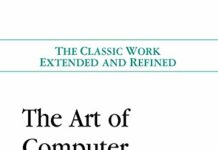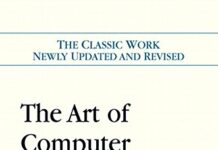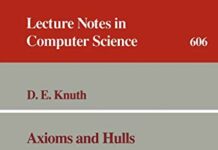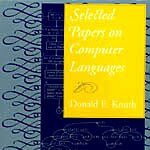
Ebook Info
- Published: 2004
- Number of pages: 276 pages
- Format: PDF
- File Size: 38.07 MB
- Authors: Donald E. Knuth
Description
This still timely collection of papers by Donald Knuth, “the father of computer science,” surveys the field of computer science and the nature of algorithms. Topics covered here include the relationship between computer science and mathematics, the connections between theory and practice, and the known limitations on what can be computed in a reasonable amount of time. Additionally, Knuth discusses the history of computer science from ancient Babylon through today.Particularly clear and accessible, these essays were written for a general audience rather than specialists in computer science. They are thus a valuable resource for not only computer scientists but for anyone interested in the history of this fascinating field.
User’s Reviews
Editorial Reviews: Amazon.com Review Knuth is, of course, one of the foremost computer scientists and has been instrumental in the invention of methods for translating and defining programming languages and mathematical analyses of algorithms. It is fair to say that computing as we know it today would not be possible without Knuth’s contributions. This is a collection of his less technical publications dealing with the relationship of computer science and mathematics, CS education, and the history of computational techniques from Babylonia to the present including an analysis of John von Neumann’s first program. Highly recommended to all serious computer scientists. Review ‘This book should be a necessary asset of any library dealing with Computer Science and related subjects, representing a major piece of culture in Computer Science. Every reader will acquire a sound understanding of the foundation for some key issues in the field … Knuth is a grand scientific author, whose dissertations on deep and abstract issues are lively and captivating pieces of reading.’ David Rozier, Mathematics Today’This book contains everything Knuth has written on computer science for the non-specialist … It is a lovely read. What – in sum – can one say, of our delightful discipline and of this delightful book? Enjoy.’ Adrian Larner, The Computer Journal Book Description Donald Knuth’s influence in computer science ranges from the invention of literate programming to the development of the TeX programming language. This anthology of essays includes articles on the history of computing, algorithms, numerical techniques, computational models, typesetting, and more. About the Author Donald E. Knuth is one of the world’s pre-eminent computer scientists, whose works have had a profound influence on the subject since the publication in 1968 of the first volume of The Art of Computer Programming. Knuth created TeX, a language for typesetting mathematical and scientific texts, and METAFONT, a computer software system for alphabet design. He is professor emeritus at Stanford University. Read more
Reviews from Amazon users which were colected at the time this book was published on the website:
⭐Chapter Table of Contents:0. Algorithms, Programs, and CS1. CS and its Relation to Math2. Math and CS: Coping with Finiteness3. Algorithms4. Algorithms in Modern Math and CS5. Algorithms Themes6.-9. Theory and Practice I..IV10. Are Toy Problems Useful?11. Ancient Babylonian Algorithms12. Von Neumann’s First Computer Program (sorting)13. The IBM 650: An Appreciation from the Field14. George Forsythe and the Development of Computer Science15. Artistic ProgrammingAudence:1) Computer Science faculty and graduate students.2) Mathematicians.3) other scientists who want to understand their computer science colleagues.Knuth is best known for his huge corpusThe Art of Computer Programming [TAOCP] (at this time vols. I-III)This text (Selected Papers) really isn’t for beginning programmers(TAOCP is better for this even if more dense).”Selected” is not a How-to book.It’s the Philosophy of the PhD on the computing field.Math:Yes. Selected Papers has a fair amount of algebra.The level of math required to understand and appreciate the book:for several of the papers, the reader needs an understanding of combinatorics:’n!’ as factorial (not exclamination point), running sums,matrix algebra, and a bit of calculus. Other papers have practically no math (the last 3 and the opening chapter[0]).Heavy emphasis appears on the concept of the iterative nature of Algorithms(in contrast to other sciences which seek closed form solutions).Can you read it w/o the math? Sure, but you would be losing major points (read it with a knowledgeable friend).The Reading:I really liked the paper on Toy problems. I needed this earlier in my career. Many computer scientists who like fun but get criticism will like this essay. It alone is worth the price of the book.The easy reading introductory parts of various papers are readable withminimum math and have valuable insights (like Knuth’s informal observation that 2% of the general populice feels comfortable thinking algorithmically).The early chapters on algorithms show the importance of experimental randomization methods.The astute review reader will notice 4 chapters (really4 speeches) on the ideas of Theory and Practice. A lot of this material is redundant, but it conforms to the ideas of stepwise refinement and it shows some of the development of DEK’s thinking. Note: he describes; he does not offer solutions.Knuth has an obscure challenge during DEK’s address to IFIP (T&P IV), slide 33. I worked toward this without knowing it.I’ll be honest with the review reader: I know the author, andhe asked me to promote this book. And it’s a book well worth promoting.The book is a pleasure to those interested in the field.Chap 4: I sat in the audience for this presentation.Every library should have a copy for inspection if not enough to have on every computer scientist’s book shelf (next to TAOCP, and other books by Don)., and it can be a good gift book to scientists.
⭐This is a wonderful book. It is a collection of papers on computer science, intended for a general audience. The technical parts are accessible to someone with a mathematical background.Some of my highlights:- chapter 1: a nice analysis of hashing- chapter 2: many combinatorial problems where we can find the best solution quickly, even though there is a vast number of possible solutions- chapter 3: many algorithms for looking up a word in a set of words- chapter 5: nice discussion about Euclid’s GCD algorithm- chapter 10: Knuth’s solution to a problem that Bob Floyd would give to incoming PhD students at Stanford- chapter 16: How George Forsythe was instrumental in starting the field of computer science
⭐Hard to say no to.
⭐I’ve put this book #6 in my Top 100 Programming, Computer and Science books list:http://www.catonmat.net/blog/top-100-books-part-two/This is one of the most accessible of Knuth’s books. I enjoyed it a lot. It’s written for people who aren’t necessarily specialists in the subject. It’s for educated people in all fields and you don’t need to know too much math to read through this book.Knuth says the following about this book, “If any of my work deserves to be remembered, it is now in the form that I most wish people to remember it.”. Knuth discusses topics such as coping with finiteness, usefulness of toy problems, theory vs practice, history of algorithms, Von Neumann’s first computer program, and many others.This is the book to buy if you want to get familiar with Knuth’s work in an accessible way and learn something new without much effort.
⭐Knuth’s most famous work, the “Art of Computer Programming” series, is justly famed. Bill Gates said something like “If you can read it all the way through, write me and I’ll hire you”. But most people can’t make it through — they’re put off by the use of assembly language, or by the amount of mathematics. I can understand that, and I always wished there was some way to get the essence and excitement of “Art of Computer Programming” without the full treatment. Now there is.”Selected Papers in Computer Science” succeeds beautifully in showing what its like to be a computer scientist, and how that is related to but different from being a mathematician. At the heart of the book are four essays on “Theory and Practice”. Actually, it should be “Practice and Theory”, because the only sensible way to progress in any field is to get some practical experience first, and then acquire the theory necessary to understand what you did, and to allow you to do more. Knuth covers this very well for computer science. I am in the habit of dog-earing pages in a book that offer an especially important insight. Looking back at my copy of “Selected Papers”, I see that about 40 pages are so marked; an amazingly high ratio for a book of 270 pages. Try a test: read 10 pages from the book at random, if you don’t find at least one important insight, then probably this book (and perhaps computer science in general) is not for you. If you do, you can be assured that the full book will give you many more.
⭐Reading this book helped me to remember why I got into computer science in the first place: it’s a whole lot of fun. As Alan Perlis admonished us, we musn’t ever lose that.All of Don Knuth’s books express how fun computer science is, but this one does it in a smallish paperback form with content that’s easier to digest as bedside or subway reading than some of his other more famous volumes.
⭐Wish I’d been able to read them when I was young but today they are of historical interest only.
Keywords
Free Download Selected Papers on Computer Science (Volume 59) (Lecture Notes) 1st Edition in PDF format
Selected Papers on Computer Science (Volume 59) (Lecture Notes) 1st Edition PDF Free Download
Download Selected Papers on Computer Science (Volume 59) (Lecture Notes) 1st Edition 2004 PDF Free
Selected Papers on Computer Science (Volume 59) (Lecture Notes) 1st Edition 2004 PDF Free Download
Download Selected Papers on Computer Science (Volume 59) (Lecture Notes) 1st Edition PDF
Free Download Ebook Selected Papers on Computer Science (Volume 59) (Lecture Notes) 1st Edition



